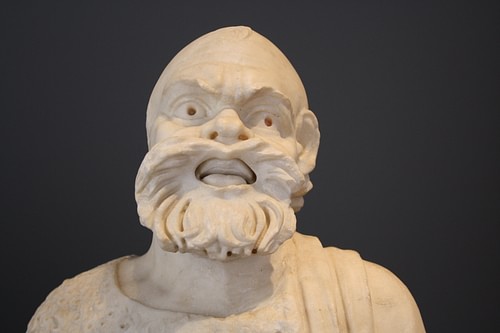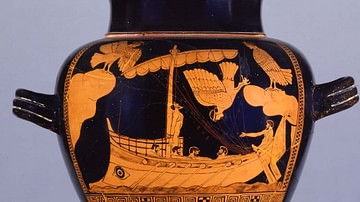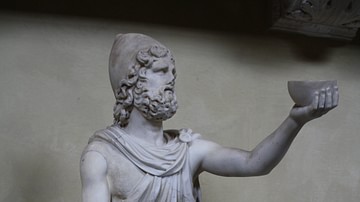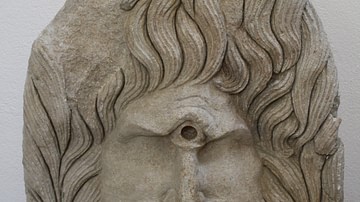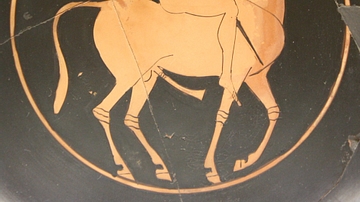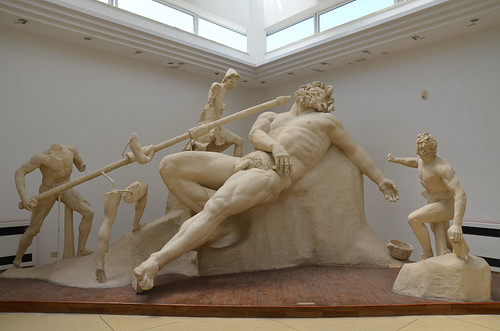
The satyr-play The Cyclops was written by Euripides, one of the great Greek tragedians, in 412 or 408 BCE. Like many of his fellow tragedians, Euripides centers his play on a well-known story from Greek mythology. The Cyclops is based on the principal character from the epic poet Homer's Odyssey: Odysseus.
A satyr-play, although similar in style and often much shorter, is not a tragedy by definition and more often than not ends happily. These types of plays focus around a chorus of creatures who are half-human and half-beast (some sources say goat, others say horse), the dedicated followers of Dionysos. As in the Odyssey, Odysseus and his crew have been blown off course while on their return journey from the Trojan War to their home island of Ithaca and so they arrive in Sicily. Seeking food, they are befriended by an elderly satyr named Silenus who, with other satyrs, is kept as a slave on the island by the Cyclops Polyphemus. Varying slightly from Homer's story, Odysseus must keep himself and his men from being eaten by Polyphemus. Eventually, he is able to blind the Cyclops and escape. The Cyclops is the only Greek satyr play which survives complete.
Life of Euripides
Very little is known of Euripides' early life. He was born in the 480's BCE on the island of Salamis near Athens to a family of hereditary priests. As the author of over 90 plays (19 have survived), he was the youngest of the great tragedians: the other two being Aeschylus and Sophocles. Although he preferred a life of solitude, alone with his books, he was married, supposedly unhappily, and had three sons, one of whom became a noted playwright. Unlike his fellow tragedians, Euripides played little or no part in Athenian political affairs; the one exception was a brief diplomatic mission to Syracuse in Sicily. The poet made his debut at the Dionysia competition in 455 BCE, not winning his first victory until 441 BCE. Unfortunately, his participation in these competitions did not prove to be very successful with only four victories; a fifth came after his death.
The Greek philosopher Aristotle (384-322 BCE) called Euripides the most tragic of the Greek poets. Classicist Edith Hamilton, in her book The Greek Way, agreed with this assessment when she wrote that he was the saddest, a poet of the world's grief. “He feels, as no other writer has felt, the pitifulness of human life, as of children suffering helplessly what they do not know and can never understand.” (205). She added that only he knew the “dark depths of pain.” Possibly embittered, and with the Peloponnesian War waging between Sparta and Athens, he left Athens in 408 BCE at the invitation of King Archelaus to live the remainder of his life in Macedonia, dying in 406 BCE. In his book Greek Drama, Moses Hadas said that audiences came to appreciate his style and outlook, viewing his plays as more sympathetic than those of his contemporaries. Although often misunderstood during his lifetime and never receiving the acclaim he deserved, he became one of the most admired poets long after his death, influencing not only Greek but Roman playwrights as well.
Play Summary
Following their victory at Troy, Odysseus and his men are returning home to Ithaca. Unfortunately, they are blown off course and land on Sicily near Mt. Etna. The island is inhabited by a Cyclops named Polyphemus, a child of the Greek god of the sea Poseidon. In search of food, they are befriended by an elderly satyr named Silenus who, along with his children, is a slave to the Cyclops giant. Knowing that the satyrs are followers of the god of wine Dionysos, Odysseus offers to exchange wine for food. Silenus warns the Greek that the Cyclops will be returning soon and would devour him and his crew. When Polyphemus returns, Silenus betrays Odysseus by accusing him of stealing the food. Odysseus and his men are herded into a cave where the Cyclops begins to eat the crew.
With the help of the satyrs, Odysseus hatches a plot to blind the Cyclops and escape. After getting Polyphemus drunk, Odysseus successfully blinds him with a giant poker - the satyrs actually prove to be of little help - and escapes. The escape is a slight variation from Homer's version of the story. Odysseus and his remaining crew are able to board his ship and leave. As he leaves the island, Odysseus mistakenly identifies himself. The Cyclops tells him that an old oracle has been fulfilled, and he is to wander the sea for years.
Cast of Characters
The rather short cast of characters includes:
- Silenus, an elderly satyr
- Odysseus, the Greek hero
- Polyphemus, the cyclops
- a chorus of satyrs.
The Play
The play opens outside a cave at the foot of Mt. Etna on the island of Sicily. While his sons are away watching a herd of sheep, Silenus - an old satyr - speaks, “I am assigned to stay and fill the troughs and clean these quarters and play chef for the godless dinner of this impious Cyclops.”(184). As his sons return, Silenus sees the Greek ship of Odysseus arrive at the nearby shore. Seeing that they are carrying pitchers and realizing they may be seeking supplies, he tells his sons, “They can't know what this Polyphemus is like, coming to this inhospitable land and - bad luck - to the Cyclops man-eating jaws.” (186). Odysseus addressed the old satyr and identifies himself, asking where he might find water. “We come from Troy and from the war there.” (187). Unfortunately, they were driven by wind and a storm to the island's shores. Silenus relates how the same thing had happened to him - chasing pirates who had captured Dionysos. When asked, he identifies the place as Etna - the highest peak in Sicily.
Curiously, Odysseus wondered who lived there, a place with no walls or houses. Silenus responds, “The Cyclops. They live in caves, not houses.” (188). There was no government, for the one-eyed giants as the cyclopes are savages and diet on milk, cheese and sheep, but, “Strangers, they say, make the tastiest meal” (188). With an attempt to be quick and escape before the Cyclops returns, Odysseus offers to buy bread and meat. Wine, however, struck a chord with old Silenus, a devout follower of Dionysos. Silenus enters the cave, returning with cheese and lambs. However, in the distance, he sees the returning Cyclops. Silenus tells Odysseus and his men that they need to hide in the cave, but Odysseus proudly refuses. “If die we must, then we must die with honor. But if we live, we live with our old glory." (193).
Upon his return, the Cyclops sees the Greeks standing outside the cave. Silenus betrays Odysseus, saying that the Greeks beat him up and stole the food. “I tried to tell them. But they went on robbing. I tried to stop them from stealing your lambs and eating your cheeses.” (194). Odysseus defends himself. “This fellow here sold us some lambs in exchange for wine - all quite voluntary, no coercion.” (195). The Cyclops, however, believes Silenus, not Odysseus. Odysseus makes a plea for his men. “Do not profane your mouth by eating us. (196). But Silenus advises him to eat all of them. The Cyclops speaks directly to Odysseus, “I shall go right on indulging myself - by eating you.” (198). Out of respect, he will, however, eat him last. When the Cyclops asks Odysseus his name, the proud Greek replies that “Nobody” was his name.
The Cyclops drags the Greeks into the cave, followed by Silenus. Odysseus watches as two of his men are eaten. “Zeus, how can I say what I saw in that cave? Unbelievable horrors, the kind of things men hear about in myths, not in real life! (199). He turns to the chorus leader, “He snatched two of my men, the soundest and plumpest. He weighed him in his hands.” (199). Odysseus offers the Cyclops a taste of his wine - “the grapes of Greece.”Plying the Cyclops with wine, Odysseus manages to free himself from the cave. Speaking to the leader again, he tells him of a plan he has devised: he will continue to feed the Cyclops wine, and “…as soon as the wine puts him to sleep, I'll take my sword and sharpen a branch of an olive tree I saw inside the cave. I'll put it in the coals and when it's burnt, I'll shove it home, dead in the Cyclops eye.” (202). To be successful, however, he'll need the chorus leader's help. The chorus leader is more than willing to help for he wishes to escape from the Cyclops as well.
Seeing Odysseus standing outside the cave, the Cyclops demands more wine - should he share it with his brothers? Odysseus tells him that he need not share it with anyone else. The Cyclops continues to drink. Odysseus tells him, “There, take it up and drink down every drop, and don't say die until the wine is gone.” (208). The Cyclops then drags Silenus into the cave. Odysseus realizes it is time to execute his plan, but the chorus leader is reluctant to help because he has sprained his ankle. An angry Odysseus shouts, “What worthless cowards. There's no help from you.” (211). Odysseus enters the cave. Suddenly the Cyclops screams, “My eye is scorched to ashes.” (212). As the Cyclops frantically and blindly searches for the Greeks, Odysseus and his men escape from the cave. The chorus leader begins giving the blinded Cyclops misdirection - “There on your left.” And, “He is in front of you.” (215). The Cyclops continues to ask, “Where is Nobody?” (213). The leader responds coolly, “Nowhere.” Before leaving, Odysseus finally identifies himself. "You have had to pay for your unholy meal.” (215). The Cyclops responds, “The old oracle has been fulfilled. It said that after you had come from Troy you would blind me. But you would pay for this, it said, and wander the seas for many years.”(215). Odysseus exits. “What's done is done.”
Conclusion
True to its word, the play did end happily, at least for Odysseus. He escaped the island but would not see his home for some time. While its exact date of production is unknown, The Cyclops remains the only complete example of a satyr play that has survived intact. The play is, of course, largely overshadowed by Homer's epic, and is not considered to be among Euripides' best and most popular works. The tragedian received, for example, considerable criticism over some of the changes he made to the story in The Odyssey. He presented the satyrs as cowards and changed Odysseus' escape by eliminating the rock that covered the cave's entrance and which had blocked the Greeks' escape. The play was translated by the English poet Percy Blythe Shelly in 1819 and is still occasionally performed.

